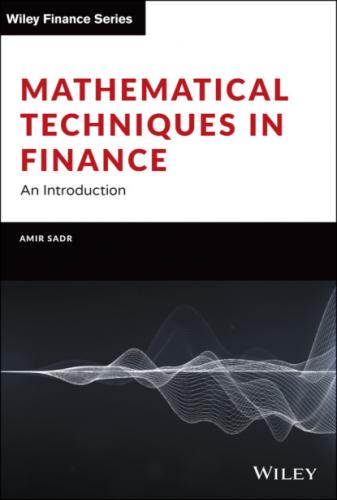232 222
233 223
234 224
235 225
236 226
237 227
238 229
239 231
240 233
241 234
242 235
243 236
244 237
Founded in 1807, John Wiley & Sons is the oldest independent publishing company in the United States. With offices in North America, Europe, Australia and Asia, Wiley is globally committed to developing and marketing print and electronic products and services for our customers' professional and personal knowledge and understanding.
The Wiley Finance series contains books written specifically for finance and investment professionals as well as sophisticated individual investors and their financial advisors. Book topics range from portfolio management to e‐commerce, risk management, financial engineering, valuation and financial instrument analysis, as well as much more.
For a list of available titles, visit our Web site at www.WileyFinance.com.
Mathematical Techniques in Finance
An Introduction
AMIR SADR
Copyright © 2022 by John Wiley & Sons, Inc. All rights reserved.
Published by John Wiley & Sons, Inc., Hoboken, New Jersey.
Published simultaneously in Canada.
No part of this publication may be reproduced, stored in a retrieval system, or transmitted in any form or by any means, electronic, mechanical, photocopying, recording, scanning, or otherwise, except as permitted under Section 107 or 108 of the 1976 United States Copyright Act, without either the prior written permission of the Publisher, or authorization through payment of the appropriate per-copy fee to the Copyright Clearance Center, Inc., 222 Rosewood Drive, Danvers, MA 01923, (978) 750-8400, fax (978) 646-8600, or on the web at www.copyright.com. Requests to the Publisher for permission should be addressed to the Permissions Department, John Wiley & Sons, Inc., 111 River Street, Hoboken, NJ 07030, (201) 748-6011, fax (201) 748-6008.
Limit of Liability/Disclaimer of Warranty: While the publisher and authors have used their best efforts in preparing this work, they make no representations or warranties with respect to the accuracy or completeness of the contents of this work and specifically disclaim all warranties, including without limitation any implied warranties of merchantability or fitness for a particular purpose. No warranty may be created or extended by sales representatives, written sales materials or promotional statements for this work. The fact that an organization, website, or product is referred to in this work as a citation and/or potential source of further information does not mean that the publisher and authors endorse the information or services the organization, website, or product may provide or recommendations it may make. This work is sold with the understanding that the publisher is not engaged in rendering professional services. The advice and strategies contained herein may not be suitable for your situation. You should consult with a specialist where appropriate. Further, readers should be aware that websites listed in this work may have changed or disappeared between when this work was written and when it is read. Neither the publisher nor authors shall be liable for any loss of profit or any other commercial damages, including but not limited to special, incidental, consequential, or other damages.
For general information on our other products and services or for technical support, please contact our Customer Care Department within the United States at (800) 762-2974, outside the United States at (317) 572‐3993 or fax (317) 572‐4002.
Wiley also publishes its books in a variety of electronic formats. Some content that appears in print may not be available in electronic formats. For more information about Wiley products, visit our web site at www.wiley.com.
Library of Congress Cataloging-in-Publication Data:
Names: Sadr, Amir, author.
Title: Mathematical techniques in finance : an introduction / Amir Sadr.
Description: Hoboken, New Jersey : John Wiley & Sons, Inc., [2022] | Series: Wiley finance series | Includes index.
Identifiers: LCCN 2022000565 (print) | LCCN 2022000566 (ebook) | ISBN 9781119838401 (cloth) | ISBN 9781119838425 (adobe pdf) | ISBN 9781119838418 (epub)
Subjects: LCSH: Finance–Mathematical models.
Classification: LCC HG106 .S23 2022 (print) | LCC HG106 (ebook) | DDC 332.01/5195–dc23/eng/20220112
LC record available at https://lccn.loc.gov/2022000565
LC ebook record available at https://lccn.loc.gov/2022000566
Cover Design: Wiley
Cover Image: © StationaryTraveller/Getty
To my students
Preface
Finance as a distinct field from economics is generally defined as the science or study of the management of funds. The creation of credit, savings, investments, banking institutions, financial markets and products, and risk management all fall under the purview of finance. The unifying themes in finance are time, risk, and money.
Mathematical or quantitative finance is the application of mathematics to these core areas. While simple arithmetic was enough for accounting and keeping ledgers and double‐entry bookkeeping, Louis Bachelier's doctoral thesis, Théorie de la spéculation and published in 1900, used Brownian motion to study stock prices, and is widely recognized as the beginning of quantitative finance. Since then, the use of increasingly sophisticated and specialized mathematics has created the modern field of quantitative finance encompassing investment theory, asset pricing, derivatives, financial data science, and the emerging area of crypto assets and Decentralized Finance (DeFi).
BACKGROUND
This book is the collection of my lecture notes for an elective senior level undergraduate course on mathematics of finance at NYU Courant. The mostly senior and some first year graduate students come from different majors with an even distribution of mathematics, engineering, economics, and business majors. The prerequisites for the book are the same as the ones for the course: basic calculus, probability, and linear algebra. The goal of the book is to introduce the mathematical techniques used in different areas of finance and highlight their usage by drawing from actual markets and products.
BOOK STRUCTURE
A simple definition of finance would be the study of money; quantitative finance could be
